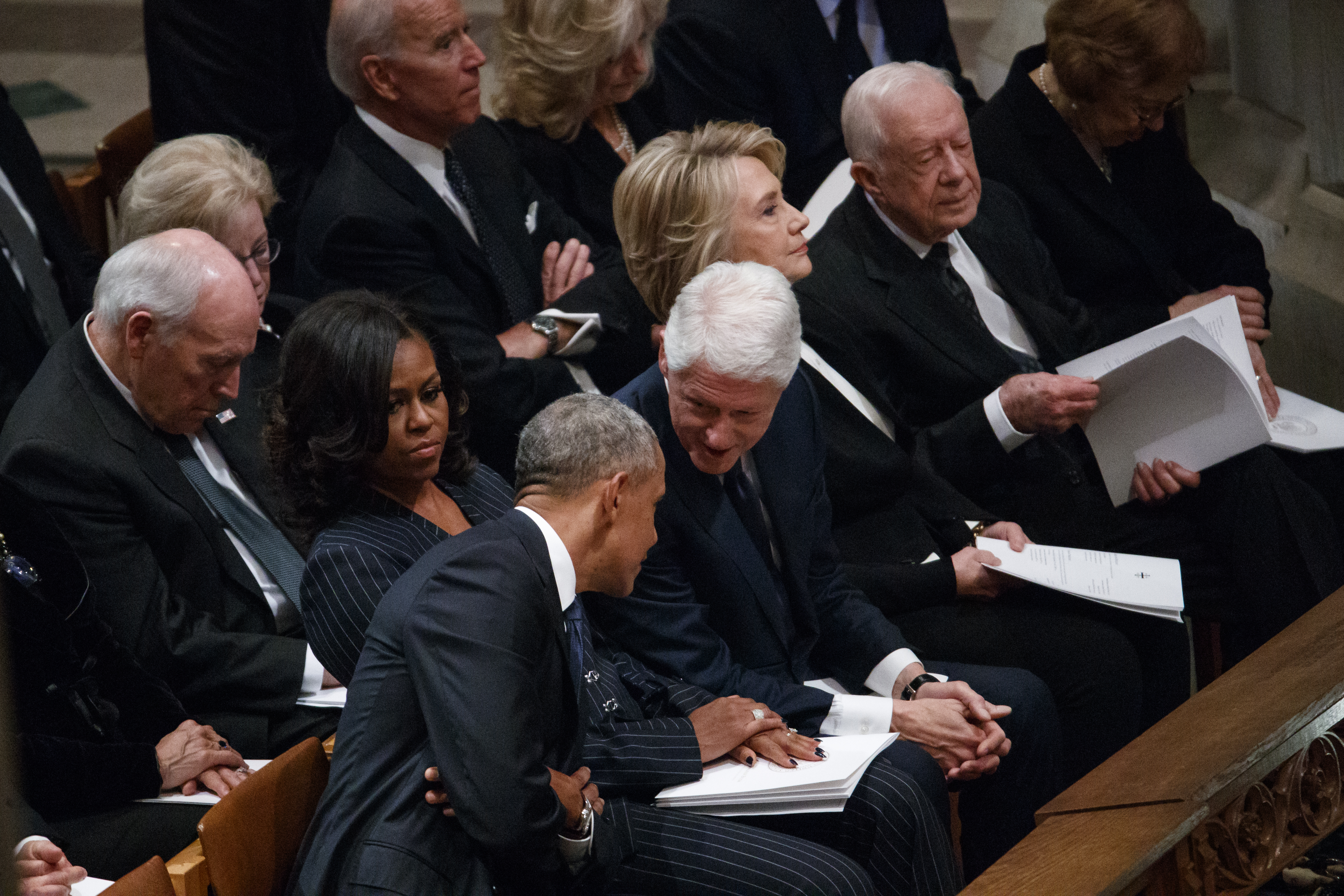Awkward atmosphere as Trump and former presidents attend Bush funeral
Since his swearing-in, Donald Trump has spurned most contact with his predecessors – and they have snubbed him in return.

America’s most exclusive fraternity – the presidents club – assembled to mourn George HW Bush, putting on public display its uneasy relationship with the current occupant of the Oval Office.
The uncomfortable reunion brought President Donald Trump together in the same pew with past White House residents who have given him decidedly critical reviews.
The late Mr Bush was the de facto chairman of the modern incarnation of the presidents club, transcending contentious campaigns and party lines to bring together fractious personalities who share that rarefied experience.
But the staid group of Oval Office occupants has been disturbed since Mr Trump’s election.

The Bushes had made it known to the White House months ago that, despite differences in policy and temperament, the late president wanted Mr Trump to attend the national service.
The ceremony’s tributes at times stood as an unspoken counterpoint to Mr Trump’s leadership, as historian Jon Meacham eulogised Mr Bush by recounting his life’s credo: “Tell the truth, don’t blame people, be strong, do your best, try hard, forgive, stay the course.”
George W Bush added of his father: “He could tease and needle, but not out of malice.”

The ex-presidents leaned over their wives to chat to one another, and Mr Clinton and former first lady Michelle Obama shared a quiet conversation.
But the Trumps’ arrival, minutes ahead of the motorcade carrying Mr Bush’s coffin, cast a pall on the conversation.

Hillary Clinton appeared to nod at Mrs Trump but did not interact with Mr Trump himself and stared straight ahead during the service.
Mr Carter waved a hand.
The president then shook hands with both Obamas before taking his seat.
After that, the small talk along the row largely stopped.
Next followed George W Bush, who, by contrast, shook hands with the entire row of dignitaries – and appeared to share a moment of humour with Mrs Obama, slipping something into her hand.
The Trump-Obama handshake marked the first direct interaction between the current president and his immediate predecessor since Inauguration Day 2017.
Mr Trump has not spoken to Democrats Mrs Clinton or Mr Obama since that day.

Democrat Mr Carter has been briefed by White House officials on North Korea, though it was not clear if he has engaged directly with Mr Trump.
Mr Trump has sought to meet the elder Bush’s passing with grace, a contrast to the rhythms of much of his tumultuous presidency.
He came to office after a campaign in which he harshly criticised his Democratic predecessors and co-opted a Republican Party once dominated by the Bush family.

“It’s unusual that a cabal of ex-presidents from both parties dislike a sitting president and that’s what you’ve got happening right now,” said Douglas Brinkley, a history professor at Rice University.
By virtue of health, longevity and opportunities for continued influence, ex-presidents are sticking around longer than ever and staying active in the public eye.
Past presidents often built relationships with their predecessors, Mr Brinkley said.
“Bill Clinton would reach out to Richard Nixon for advice on Russia,” he said. “Harry Truman leaned heavily on Herbert Hoover. It’s endless.”
But Mr Brinkley added that those ties vary from president to president and there have been chilly relationships as well, noting, for example, that “FDR would never talk to Herbert Hoover”.
Busy with a mix of personal pursuits, charitable endeavours – and, in some cases, paid speaking gigs – the former leaders do not mingle very often, making a funeral in their group a big occasion.

But all the living former presidents have aimed barbs – directly or indirectly – at Mr Trump.
In a speech in September, Mr Obama slammed the “crazy stuff” coming out of the White House without directly naming Mr Trump.
Last year, the younger Bush made a speech that confronted many of the themes of Mr Trump’s presidency without mentioning him by name, cautioning that “bigotry seems emboldened” and the nation’s politics “seems more vulnerable to conspiracy theories and outright fabrication”.
Over the summer, Mr Carter told The Washington Post that Mr Trump’s presidency was a “disaster”.
And Mr Clinton – stung by Mr Trump’s defeat of his wife in the 2016 presidential race – told a weekly newspaper in New York state after her stunning loss that Mr Trump “doesn’t know much”.
Even the late Mr Bush’s feelings about Mr Trump were harsh at times.
In Mark K Updegrove’s book The Last Republicans, published last year, the elder Bush called Mr Trump a “blowhard”.
The late Bush said he voted for Mrs Clinton in 2016 while George W Bush said he voted for “none of the above”.
There have been other moments when the ex-presidents offered more sympathetic sentiments for Mr Trump.

Mr Carter told The New York Times in 2017 the media had been harder on Mr Trump than other presidents.
Mr Clinton said in June that America should be rooting for Mr Trump to succeed in his North Korea talks.
While he has struggled to set the right tone in past moments of national grief, Mr Trump has gone out of his way to address Mr Bush’s passing with consideration, issuing kind statements and ensuring that Bush family members had whatever they needed for the funeral.
On Tuesday, Mrs Trump welcomed Laura Bush and other family members for a tour of the White House Christmas decorations.
And Mr Trump and the first lady visited with members of the Bush family at Blair House.





